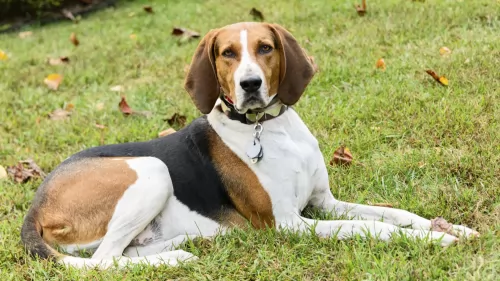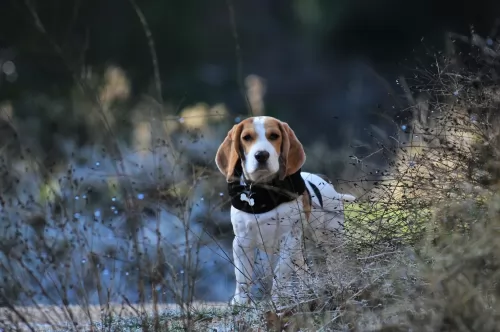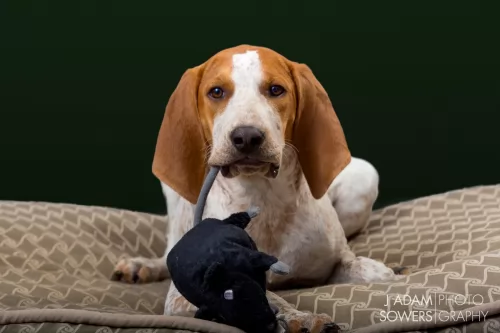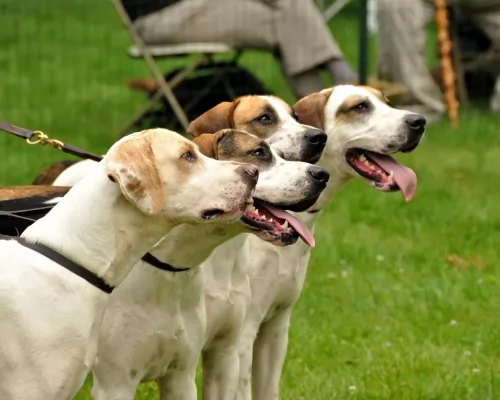 Petzlover
Petzlover American English Coonhound is originated from United States but Pumi is originated from Hungary. American English Coonhound may grow 22 cm / 9 inches higher than Pumi. American English Coonhound may weigh 12 kg / 27 pounds more than Pumi. Both American English Coonhound and Pumi has almost same life span. American English Coonhound may have more litter size than Pumi. American English Coonhound requires Low Maintenance. But Pumi requires Moderate Maintenance
American English Coonhound is originated from United States but Pumi is originated from Hungary. American English Coonhound may grow 22 cm / 9 inches higher than Pumi. American English Coonhound may weigh 12 kg / 27 pounds more than Pumi. Both American English Coonhound and Pumi has almost same life span. American English Coonhound may have more litter size than Pumi. American English Coonhound requires Low Maintenance. But Pumi requires Moderate Maintenance
 The American English Coonhound was developed in the Southern part of the United States from the variety of English hunting dogs that came to the States with the early settlers. At one point they were known as the Virginia Hound. This breed is well known for its prowess in hunting raccoons and her endurance and speed. Of course as a hound dog he loves to howl during the hunt and at home with the family. He can be frustrated and destructive if his energy and need for a job are not satisfied.
The American English Coonhound was developed in the Southern part of the United States from the variety of English hunting dogs that came to the States with the early settlers. At one point they were known as the Virginia Hound. This breed is well known for its prowess in hunting raccoons and her endurance and speed. Of course as a hound dog he loves to howl during the hunt and at home with the family. He can be frustrated and destructive if his energy and need for a job are not satisfied.
 The Pumi is a small to medium sized dog which comes from Hungary. They have always been used for guarding livestock.
The Pumi is a small to medium sized dog which comes from Hungary. They have always been used for guarding livestock.
It was in 2004 that the the Pumi was accepted by the American Kennel Club Foundation Stock Service program. Also in the country of the dog’s birth, the Pumi Club was founded, and in 2011, the dog was also accepted into the AKC into the Miscellaneous class and into the herding group too.
In the UK in 2015, the Kennel Club also accepted the breed standard
 The American English Coonhound is an athlete with a deep chest and cute face. They have broad heads, domed skulls, dark eyes and soft, low ears. They are as fast and athletic as they look. These are highly athletic dogs with long legs and a slim but muscular body. They are so well built for their hunting role, that any deficiencies are quickly identified and bred out of the breed.
The American English Coonhound is an athlete with a deep chest and cute face. They have broad heads, domed skulls, dark eyes and soft, low ears. They are as fast and athletic as they look. These are highly athletic dogs with long legs and a slim but muscular body. They are so well built for their hunting role, that any deficiencies are quickly identified and bred out of the breed.
 The coat is a fawn, greyish silver or sandy color. The grey Pumi's are thought to be the more common color.
The coat is a fawn, greyish silver or sandy color. The grey Pumi's are thought to be the more common color.
The medium length coat is thick and curly with the top coat being fairly harsh to the touch.There is very little shedding. The dog has semi-erect, semi-floppy ears which are high set. The eyes are small and dark.
With his tight curly coat, his kinky tail and bright expression, you’d think the Pumi was just for entertainment and a playmate, but he is a serious worker too, loving to be busy, whether for work or play.
The Pumi is lively and bold and always ready for fun and action. He is intelligent too, and early training and socialization will be important to keep him manageable and a pleasure to have around. Because he is smart he won’t have trouble learning. They’re good with children and other dogs in the family.
 The American English Coonhound knows how to relax just as much as he knows how to work. He is mellow after work and tenacious in the chase. This is not the dog for a first-time owner. They are stubborn and hard to train. They howl and bark at home as much as they do on the hunt. They need a strong pack leader, especially when living in the city or neighborhoods.
The American English Coonhound knows how to relax just as much as he knows how to work. He is mellow after work and tenacious in the chase. This is not the dog for a first-time owner. They are stubborn and hard to train. They howl and bark at home as much as they do on the hunt. They need a strong pack leader, especially when living in the city or neighborhoods.
They are outgoing and friendly and very sensitive. They mature later than most other breeds their size. They are about 2 when they mature.
 The Pumi is a comical looking dog which some people assume makes him a bit of a lapdog, but this isn’t true. Yes, he loves to receive love and attention from his human family, but he isn’t a lapdog.
The Pumi is a comical looking dog which some people assume makes him a bit of a lapdog, but this isn’t true. Yes, he loves to receive love and attention from his human family, but he isn’t a lapdog.
He likes to be busy if he can. He is smart and quick to learn and is affectionate, playful, loyal and loving.
His small size allows him to adapt easily to life in the city or the countryside, but he will need to be exercised. If you’re looking for a lively, amicable pet and companion, the Pumi can make an excellent family pet.
 If kept active and happy, the American English Coonhound has very few health problems. The benefit from a large gen pool but do have some health concerns including elbow and hip dysplasia, ear infections, cataracts, bloat, and Progressive Retinal Atrophy. They do have a tendency to gain weight as they age. These issues will be addressed in more detail below. DNA testing is available for the dysplasia and eye issues.
If kept active and happy, the American English Coonhound has very few health problems. The benefit from a large gen pool but do have some health concerns including elbow and hip dysplasia, ear infections, cataracts, bloat, and Progressive Retinal Atrophy. They do have a tendency to gain weight as they age. These issues will be addressed in more detail below. DNA testing is available for the dysplasia and eye issues.
 With the Pumi, you’re really getting a robust little dog. With good care, he can push to 14 years of age and even much older. Of course, as with all other dogs, he is prone to some of the more common dog illnesses.
With the Pumi, you’re really getting a robust little dog. With good care, he can push to 14 years of age and even much older. Of course, as with all other dogs, he is prone to some of the more common dog illnesses.
Hip dysplasia is nearly always one that needs to be listed as it is really a common dog ailment that can lead to lameness.
This is an abnormal formation of the hip socket which in its severest form can lead to lameness. Luckily there are advances in veterinary medicine that make it possible for a dog with hip dysplasia to be happy and pain free.
This is an incurable, progressive disease which effects the spinal cord of your dog and is found mostly in older dogs. It’s very sad because as the disease progresses it can lead to loss of coordination in the hind legs, difficulty with supporting weight with the hind legs and also urinary and fecal incontinence.
This is an inherited disease that sadly might require you saying goodbye to your beloved 4-legged family member.
 your working American English Coonhound needs different food than one who is not working. So, if you hunt with your dog remember he really needs the calories to keep his energy up. However, they can get obese as they age so cut back with less activity and more years. Watch the number of treats when training.
your working American English Coonhound needs different food than one who is not working. So, if you hunt with your dog remember he really needs the calories to keep his energy up. However, they can get obese as they age so cut back with less activity and more years. Watch the number of treats when training.
Elbow and Hip Dysplasia – the joint issues prevent the bones from connecting and functioning properly. Any good breeder of American English Coonhounds will do tests for both.
Eye issues range from cataracts to PRA (Progressive Retinal Atrophy) Again there are tests available for these conditions.
Bloat is a condition many medium to large size dogs can experience when their stomach can become inverted and intestines distended. The is a situational issue and can’t be predicted. Don’t allow your coonhound to wolf down food right before exercise and feed him more than once a day in a smaller meal.
The American English Coonhound needs a lot of exercise and has an extremely strong work and prey drive.
 You can never be slack when it comes to choosing food for your pet. If you can provide him with wholesome food then you will be promoting health and longevity.
You can never be slack when it comes to choosing food for your pet. If you can provide him with wholesome food then you will be promoting health and longevity.
If you choose one of the commercially manufactured dog foods, make sure it is the high quality ones full of vitamins and minerals and free from all kinds of colorants and fillers.
Certainly provide him with some home-made food too, but keep it simple and tasty. An excellent home-made diet is boiled chicken, brown rice or pasta, sweet potatoes, carrots and spinach, all chopped up and mixed in twice a week with the dry kibble.
Every now and again, if you can afford it, you can also give him some raw meat added into the kibble. Plain and simple, your pet will thank you for providing him with an uncomplicated diet, gentle on his digestive system.
Make sure he always has a bowl of fresh, cool water available to him.
Energetic and lively, the Pumi is going to need regular exercise as well as mental stimulation. Show him a tennis ball and his eyes will light up as he just loves a game. Take him on a walk and include him in your ball games.
The Pumi’s coat is medium length and curly and he will need it combed to keep it free of matting. The coat will also need to be trimmed if you don’t want it becoming unruly.He isn’t a heavy shedder but will need his coat being attended to twice a week.